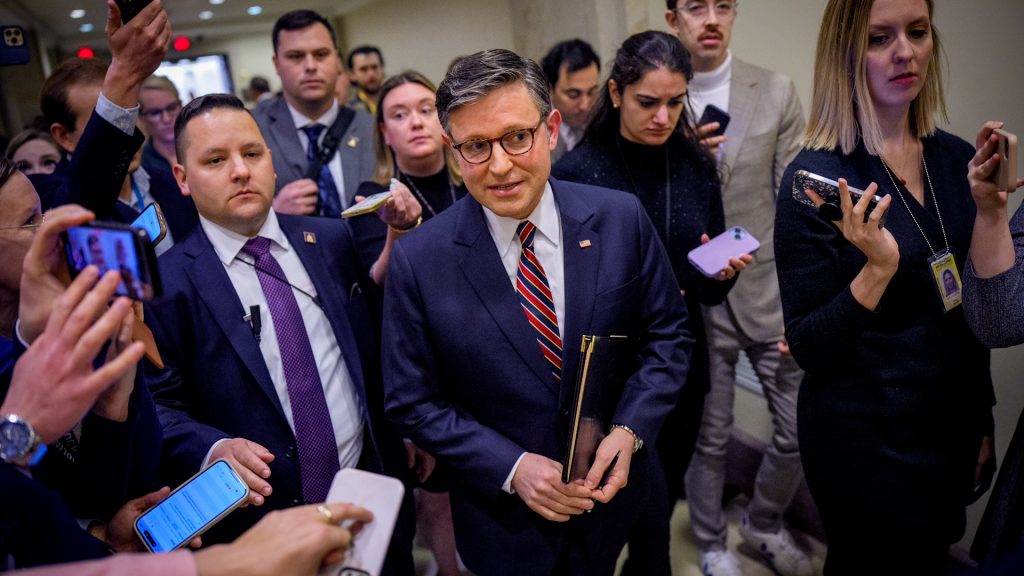House Republican leaders delay budget vote over GOP opposition
Ella Greene April 10, 2025 0
- The House postponed a vote on a Trump-endorsed budget resolution due to insufficient support from GOP lawmakers. House Speaker Mike Johnson has sought to address concerns and garner votes.
- The resolution would enable Republicans to advance key priorities, including tax cuts and defense spending, through reconciliation.
- Trump has actively lobbied lawmakers to support the resolution, but Republican leaders still face opposition from fiscal conservatives over spending cuts and budgeting methods.
Full Story
House Republican leaders delayed a scheduled vote Wednesday, April 9, on a budget resolution endorsed by President Donald Trump, acknowledging there weren’t enough votes to pass. Speaker Mike Johnson said discussions continued late into the evening to win over skeptical GOP lawmakers, adding that changes to the resolution were still possible.
What is the resolution’s purpose?
The resolution passed by the Senate would start the reconciliation process, enabling Republicans to pass legislation through the Senate with just a simple majority, instead of the usual 60 votes. Using this approach, Republicans can advance key Trump priorities — such as extending tax cuts, increasing defense spending and enhancing border security — without relying on Democratic votes.
The House’s version of the budget aims for spending cuts exceeding $1.5 trillion. In contrast, the Senate’s version suggests much smaller reductions, approximately $4 billion. This disparity has disappointed fiscal conservatives.
What issues are Republicans divided over?
A group of House Republicans argued that the Senate’s proposed spending cuts aren’t deep enough. They are also uneasy about the Senate’s budgeting method, referred to as “current policy,” which assumes that extending existing tax cuts does not contribute to new spending. In contrast, the House’s “current law” approach treats such extensions as additional expenses.
Prominent conservatives, including Rep. Chip Roy and Rep. Eli Crane, have publicly criticized the Senate’s plan as insufficient, arguing that it fails to meet GOP promises of fiscal responsibility.
What role does Trump play in the negotiations?
Trump has actively pushed Republican lawmakers to support the resolution. He’s personally met with skeptical Republicans, made public appeals and posted multiple statements on social media encouraging party unity.
At a recent GOP fundraiser, Trump urged hesitant lawmakers to “close your eyes and get there,” positioning the resolution as crucial to winning congressional seats in the 2026 midterm elections.
Despite Trump’s personal lobbying, Republican leadership still didn’t secure the necessary votes by Wednesday evening.
What happens next?
Johnson said the House might revisit the vote after further negotiations or potential amendments.
With lawmakers set to leave soon for a two-week recess, GOP leaders are deciding whether to revise the Senate’s bill or enter direct negotiations with Senate counterparts. Any amendments would require Senate approval before becoming final
Johnson also noted that Republicans could return to Washington next week if no deal emerges before the recess.
Ella Rae Greene, Editor In Chief
Ella Greene
Ella and the staff at Clear Media Project (CMP) curate these articles.
Unless otherwise noted CMP does not write these articles.
The views, thoughts, and opinions expressed in the articles published on this blog belong solely to the original authors and do not necessarily reflect the views of the blog owner. The blog owner does not claim ownership of the content shared by contributors and is not responsible for any inaccuracies, errors, or omissions.
All rights and credits goes to its rightful owners. No Copyright Infringement is intended. If you believe any content infringes on your rights, please contact us for review and potential removal.





